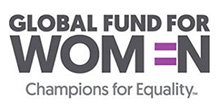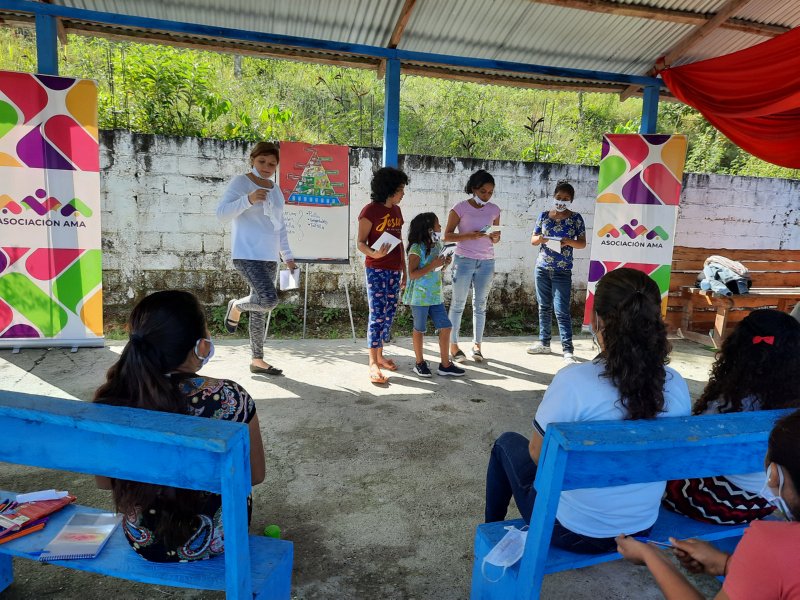
Project Name:
Strengthening Sustainable Gains for Comprehensive and Differentiated Health Access for Adolescent Girls and Women (Phase I / 2022)
Start Date: January/2022
End Date: December/2022
1,200 Empowered Girls and Young Women
The project “Strengthening Sustainable Gains for Comprehensive and Differentiated Health Access for Adolescent Girls and Women (Phase I)” aimed to enhance comprehensive and differentiated Sexual and Reproductive Health care for Maya Q'eqchí and mestizo adolescent girls in Southern Petén, Guatemala.
To achieve the project's objectives, the following activities were carried out:
Activities 2022
Five interactive training circles were conducted with 100 Maya Q'eqchí and mestizo adolescent girls from the municipalities of Poptún, El Chal, and La Libertad, Petén. The circles covered topics related to healthy hygiene habits, responsible sexuality, pregnancy prevention, gender violence, and online violence.
Participants included adolescent girls who are sexual violence survivors from the AHICAM Home, Machaquilá, the basic education institute in Canchacan, Poptún, the municipal basic education institute in El Edén, El Chal, and the Indigenous Institute for Integral Rural Development (INDRI).
The circles were facilitated by two young Maya Q'eqchí and mestizo project technicians from AMA, the adolescent component coordinator of the Petén Sur Oriente Health Area, and an educator from the Secretary Against Sexual Violence, Exploitation, and Trafficking of Persons (SVET), using the “Learning by Doing” inductive-deductive methodology.
Participants received culturally relevant educational materials on violence prevention and COVID-19.
This empowerment process for adolescent girls in Petén is crucial, considering that the Sexual and Reproductive Health Observatory (OSAR) in Guatemala reported that from January to December 2021, 72,077 adolescent girls aged 10 to 19 became mothers, 3,722 of whom are from the department of Petén.
Six interactive training camps were organized with traditional Maya Q'eqchí and mestizo midwives (comadronas) from the Health Districts of Southern Petén. Coinciding with the "International Women's Day", the series of interactive training camps began with the objective of strengthening comprehensive and differentiated health access for adolescent girls and women in Southern Petén.
The six camps involved the participation of 120 traditional midwives and birth attendants from the Health Districts of Poptún, San Luis, Chacté, Dolores, El Chal, and Santa Ana, Petén, with approximately 20 midwives and birth attendants from each municipality.
The camps covered topics such as the role of traditional midwives in reducing maternal mortality, care of pregnant women, childbirth, and newborns, the importance of timely referral of pregnant women, participation in rural health commissions and their link with health services, and sharing experiences during the pandemic.
Recognizing that traditional midwives provide care to women in communities, efforts are being made to work in partnership with Health Districts, the reproductive health program of the Petén Sur Oriente Health Area, and the Global Fund For Women to ensure that they are trained to offer better care to more than 1,200 adolescent girls and women in Southern Petén.
nstitutions like the Indigenous Women's Defense Office (DEMI), the Secretary against Sexual Violence, Exploitation, and Trafficking of Persons (SVET), and the Human Rights Ombudsman's Office (PDH) joined the initiative. Recognizing the crucial role that traditional midwives play in comprehensive and differentiated health care and the human rights of adolescent girls, these institutions utilized the space to disseminate information about the care and reporting services offered by their respective institutions.
Six interactive training workshops were conducted for Maya Q'eqchí and mestizo health district staff in Southern Petén. These workshops aimed to strengthen comprehensive and differentiated care for adolescent girls, prevent early pregnancies, address sexual violence, and ensure safe childbirth by adhering to quality standards for adolescent care.
The process involved 150 health district staff members from Southern Petén (Santa Ana, El Chal, Dolores, Poptún, San Luis, Chacté), who play a crucial role in providing comprehensive and differentiated health care for adolescent girls and in the prevention of early pregnancies.
For the AMA Association, strengthening the implementation of the national plan for the prevention of adolescent pregnancies (PLANEA) is key to addressing the issue of early pregnancies, as adolescent girls are neither physically nor mentally prepared to have a baby and face a higher risk of spontaneous abortion. This objective is one of the focal points of the series of interactive training workshops aimed at the health district staff in Southern Petén.
Achieving quality standards enhances the quality of health services and their accessibility to more than 1,500 adolescent girls in Southern Petén, which will lead to an improved quality of life for them. Therefore, the capabilities of the health district staff in Southern Petén are being strengthened.
As part of the project "Strengthening Sustainable Gains for Access to Comprehensive and Differentiated Health for Adolescent Girls and Women," executed by the AMA Association in partnership with the Global Fund for Women (FGM) and the Petén Sur Oriente Health Area, a two-day workshop was held for community staff from the health districts of the Petén Sur Oriente health area.
The workshop aimed to enhance the technical capabilities of the health district staff in complying with regulations related to Sexually Transmitted Infections (STIs) and HIV/AIDS.
The workshop involved 75 health post managers, microscopists, laboratory technicians, educators, nurses, social workers, and doctors. They were trained in guidelines for conducting HIV, syphilis, Hepatitis B, and Hepatitis C tests, with a focus on strategies for assisted notification to contacts and/or partners (NAC), PITC, Track and Trace, and Localization.
These activities seek continuous improvement in the care provided to the population within the service network of the Petén Sur Oriente Health Area.
Results Achieved 2021
- Interactive Training Circles with Adolescent Girls
100 adolescent Maya Q'eqchí and mestizo girls from the municipalities of Poptún, El Chal, and La Libertad, Petén. - Interactive Training Camps with Traditional Midwives
120 traditional midwives and birth attendants from the Health Districts of Poptún, San Luis, Chacté, Dolores, El Chal, and Santa Ana, Petén. - Interactive Training Workshops with Health District Staff in Southern Petén
150 Maya Q'eqchí and mestizo health staff from the Southern Petén health districts (Santa Ana, El Chal, Dolores, Poptún, San Luis, Chacté).
- 1,200 adolescent girls and young women, Maya Q'eqchí and mestizas, from impoverished communities in Southern Petén, receiving care from traditional midwives and birth attendants.
- 1,500 adolescent girls, Maya Q'eqchí and mestizas, from impoverished communities in Southern Petén, receiving care in public health services.
Volunteering:
1,200 adolescent girls and young women, Maya Q'eqchí and mestizas, from impoverished communities in Southern Petén, empowered through interactive training circles.
120 traditional midwives and birth attendants, Maya Q'eqchí and mestizas, from the Health Districts of Poptún, San Luis, Chacté, Dolores, El Chal, and Santa Ana, Petén, who enhanced their knowledge in interactive training camps.
100 adolescent girls, Maya Q'eqchí and mestizas, from impoverished communities in Southern Petén, are empowered about their Sexual and Reproductive Rights, allowing them to make informed and responsible decisions about their lives and sexuality, and to steer clear of harmful practices like early pregnancies and sexual violence.
1,200 adolescent girls and young women, Maya Q'eqchí and mestizas, from impoverished communities in Southern Petén, receive improved culturally relevant care in sexual and reproductive health through traditional midwives and birth attendants.
1,500 adolescent girls, Maya Q'eqchí and mestizas, from impoverished communities in Southern Petén, have increased access to comprehensive and differentiated care in public sexual and reproductive health services, through enhanced capabilities of health district staff of the Petén Sur Oriente Health Area regarding quality standards for adolescents.
COVID-19 has intensified the risks and inequalities faced by adolescent girls and young women in Guatemala, especially in Southern Petén. Significant issues include a decline in the learning curve due to the closure of public schools, decreased attention in sexual and reproductive health services, increased domestic and sexual violence, early pregnancies, and rising poverty, particularly affecting indigenous and mestizo families of adolescent girls and young women from rural and urban marginal areas.
These situations have resulted in an increase in pregnancies and sexual violence among adolescent girls, as the absence of schools and limited health service coverage reduces their already low access to Sexual and Reproductive Rights and Comprehensive and Differentiated Care. Access to comprehensive sexuality education and sexual and reproductive health services is crucial.
The National Observatory of Sexual and Reproductive Health (OSAR) reported that from January to December 2021, 72,077 adolescent girls aged 10 to 19 became mothers, 3,722 of whom are from the department of Petén.
The donor who funded this project








































































































































































































